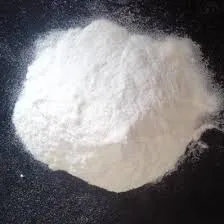
Oct . 31, 2024 07:15 Back to list
hydroxyethyl cellulose
Hydroxyethyl Cellulose A Versatile Polymer in Various Applications
Hydroxyethyl cellulose (HEC) is a non-ionic, water-soluble polymer derived from cellulose, the most abundant natural polymer on Earth. HEC has gained significant attention in various industrial applications due to its unique properties, including viscosity modification, film-forming capabilities, and excellent compatibility with other compounds. This article explores the characteristics and diverse applications of hydroxyethyl cellulose.
One of the main features of HEC is its ability to dissolve in cold or hot water, forming a clear, viscous solution. This property makes it an essential thickening agent in many formulations. In the cosmetics and personal care industry, HEC is widely used in products like shampoos, conditioners, lotions, and gels. Its thickening capabilities and ability to enhance the texture of formulations provide stability and improve the overall sensory experience for consumers. Furthermore, HEC acts as a stabilizer in emulsions, helping to prevent the separation of oil and water phases.
In the construction industry, hydroxyethyl cellulose is used as a key ingredient in cement-based products, including tile adhesives, plaster, and grout. HEC contributes to improved workability, extending the open time of the mixtures, and enhancing adhesion properties. Additionally, its water-retaining capacity helps to prevent cracking and ensure optimal curing of construction materials.
hydroxyethyl cellulose

The pharmaceutical sector also benefits significantly from HEC. Its biocompatibility and non-toxic nature make it an ideal excipient for drug formulations. HEC is often employed in controlled-release systems, where it regulates the release of active pharmaceutical ingredients, ensuring that medications are delivered at a desired rate over time. This controlled release is vital for improving the efficacy and reducing the side effects of various drugs.
Moreover, hydroxyethyl cellulose finds applications in the food industry, used as a thickener or stabilizer in various food products. Its ability to enhance texture without altering taste makes it a valuable additive in sauces, dressings, and frozen foods.
In summary, hydroxyethyl cellulose is a multifunctional polymer with widespread applications across numerous industries. Its unique properties not only improve the performance of products but also contribute to consumer satisfaction. As industries continue to innovate and develop new formulations, the role of HEC is expected to expand, cementing its position as a vital ingredient in modern formulations.
-
Unlocking the Benefits of HPMC Products: A Gateway to Versatile Applications
NewsAug.07,2025
-
Unleashing the Potential of HPMC Ashland: A Comprehensive Look
NewsAug.07,2025
-
Tile Bonding Cellulose: The Key to Superior Adhesion and Durability
NewsAug.07,2025
-
Hydroxypropyl Methylcellulose Powder: The Versatile Component in Modern Pharmaceuticals
NewsAug.07,2025
-
Hydroxyethyl Cellulose: The Versatile Solution for Various Industries
NewsAug.07,2025
-
Hydroxyethyl Cellulose (HEC): The Versatile Polymer for Various Applications
NewsAug.07,2025







